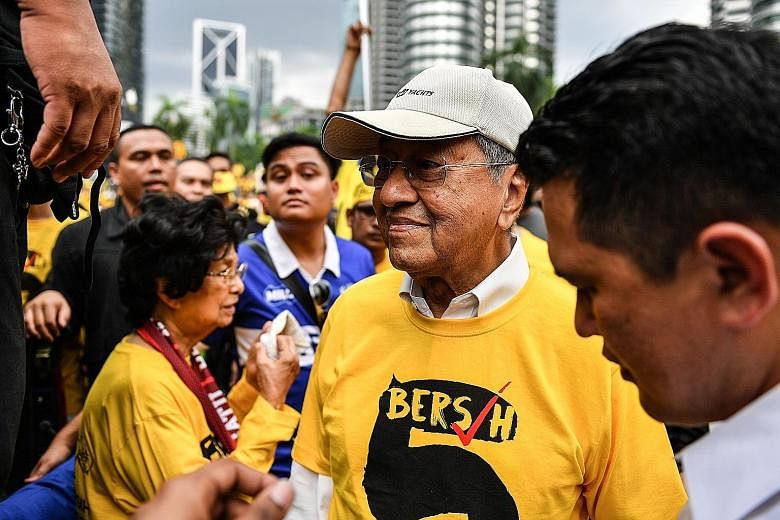"There are no permanent friends or enemies in politics." This saying is an apt description of contemporary Malaysian politics.
Within the last couple of years, prominent politicians have moved across the political divide, with members from the ruling coalition joining the opposition, and vice versa. On the ideological front, some leaders are promoting values they once denounced, while others are willing to share the same stage with former adversaries.
However, Malaysians should be concerned whenever their leaders make such political "U-turns". They must ask whether their leaders' utterances are genuine - or born simply out of expediency.
Recently, Prime Minister Najib Razak labelled his former mentor Mahathir Mohamad a "U-turn" champion. Indeed, Dr Mahathir, Malaysia's former prime minister and chairman of the newly formed opposition Parti Pribumi Bersatu Malaysia (PPBM ), now supports the government's 1Malaysia People's Aid (Bantuan Rakyat 1Malaysia or BR1M) scheme - a programme he once criticised.

Under the scheme, introduced in 2012, the government hands a one-off RM500 (S$160) to every household earning less than RM3,000 a month. The government has promised to increase the payment to RM1,200 before next year, which, coincidentally, is when Malaysians are likely to go to the polls.
Dr Mahathir once considered the scheme a form of vote-buying by Datuk Seri Najib's government. But now, he has promised to retain it, although with slight tweaks if the opposition forms the government.
Mr Najib has also criticised Dr Mahathir for making a U-turn on foreign direct investment. He condemned Dr Mahathir for politicising the Johor Forest City project, which has attracted colossal investments from China. Under the project, the government will build houses for 700,000 people on artificial islands. Dr Mahathir has accused Mr Najib of selling Johor's sovereignty to foreigners.
In response, the Prime Minister and Johor's Sultan Ibrahim Iskandar censured Dr Mahathir because the project was open to all investors, including Johoreans. Dr Mahathir's comments immediately drew comparisons with his "Look East policy" in the 1980s, when he was prime minister. Then, Dr Mahathir had encouraged foreign direct investment in Malaysia from Asian countries, particularly Japan.
There are other examples of Dr Mahathir's political U-turns. First, his rapprochement with Mr Lim Kit Siang, a Democratic Action Party (DAP) leader who has, throughout his political career, fought for a secular, race-blind Malaysia, as opposed to the Malay supremacy ideology of the United Malays National Organisation (Umno).
Then, there is how Dr Mahathir now seems open to cooperating with Anwar Ibrahim, his former deputy prime minister whom he sacked. In 2013, when Dr Mahathir was still campaigning for Umno, he was adamant that Anwar was unfit to be the country's prime minister.
Still, both Mr Lim and Anwar are also not immune from political U-turns.
The DAP's willingness to cooperate with Dr Mahathir, whom it once accused of being authoritarian, has raised doubts about its principles. Similarly, not only has Anwar consented to his Parti Keadilan Rakyat working with Dr Mahathir, but he has also allowed his wife and daughter to join Dr Mahathir's rallies.
Mr Najib is himself not above political U-turns. When he assumed power in 2009, he sought to reinstate the country's multicultural and multi-religious values in line with the Constitution. He introduced the concept of 1Malaysia to unite Malaysians, and then declared that Malaysia practises Islam Wasatiyyah (Moderate Islam).
However, after a poor showing in the 2013 elections, which saw the ruling coalition fail to secure more than half of the popular vote, Mr Najib took a more Islamist-turn. He began to edge closer to the Parti Islam Se-Malaysia (PAS), and suggested that Umno and PAS unite for the upcoming elections.
In November last year, the government allowed PAS to introduce a private member's Bill to amend Act 355, to increase the maximum punishments in syariah courts in Malaysia, ignoring Umno's non-Muslim partners in the ruling coalition. Mr Najib's 1Malaysia now seems forgotten.
One party not associated with political U-turns is PAS.
The party has been consistent in championing tougher Islamic laws in the country. The party has never lost sight of this objective, even though it had to take pragmatic steps by toning down its requests at times. For instance, in 2008, PAS leaders called for Negara Berkebajikan (a Benevolent State) instead of Negara Islam (an Islamic State).
Alliances between parties with different ideologies are a norm in modern democracies, although parties from extreme ends of the political spectrum rarely converge.
However, in a situation where politicians make constant U-turns, it calls personal integrity, more than anything else, into question. The danger of allowing such U-turns to be a norm is that sensationalist and populist politics will prevail, where obtaining power is most important, while ideology and principles take a back seat.
It is time Malaysians raise the bar for their politicians, and demand that they explain and address the reasons for their U-turns.
- The writer is a fellow with ISEAS - Yusof Ishak Institute. He researches Singapore, Malaysia and Indonesia politics.

